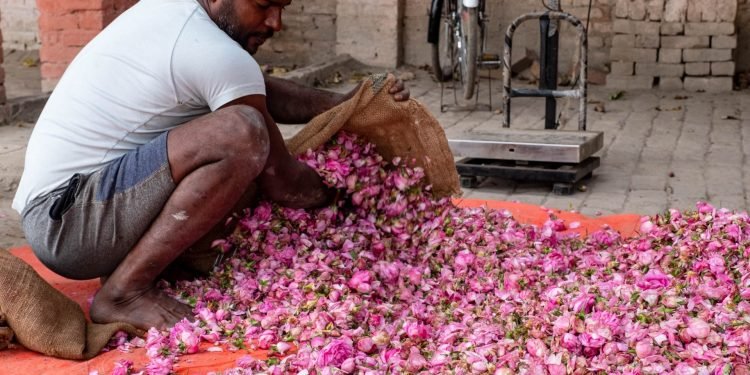Kannauj, India — Gopal Kumar pulled apart the bulb of a flower and pointed to where the roots of the petals had turned a little black inside. This is when the marigolds smell the best and are ready for picking, he said. He picked a pink rose next and sniffed. “You can only find this smell in Kannauj,” he said.
Kumar has been growing flowers outside Kannauj – a sleepy town nestled on the fertile plains of the Ganges in northern India – for 50 years. His flowers are used in the making of ittars, natural perfumes produced by distilling flowers, herbs, plants or spices over a base oil, which takes on the scent of the raw material.
Once a sophisticated kingdom in northern India, Kannauj is famed for its production of ittars using an ancient method called deg-bhakpa. This is a slow, laborious process of hydrodistillation devoid of all modern equipment that has survived in hundreds of small-scale distilleries across Kannauj and in surrounding cities.
Despite a long heritage of fragrance and scent, economic liberalisation of the late 1980s led to a period of decline in India’s ittar industry as cheap, alcohol-based perfumes were introduced from the West. Until the 1990s, there were 700 distilleries in Kannauj, but their numbers dropped to 150 to 200 by the mid-2000s. Trying to compete on price, some manufacturers started using alcohol as the base rather than more expensive sandalwood oil, degrading the quality and purity of the products.
Post-liberalisation, rather than selling directly to consumers, the vast majority of ittars and essential oils produced in India were exported to other businesses – either as an input into perfumery and cosmetic industries in the West or to the tobacco industry. Rosewater is an ingredient in chewing tobacco.
But in the past few years, several young, predominantly female Indian entrepreneurs have spotted a gap in the market between these indigenous artisanal skills and India’s thriving consumer culture, and a new set of homegrown brands has emerged.
Boond Fragrances is one such company, established in May 2021 during the pandemic by a sister and brother, Krati and Varun Tandon, to help preserve and raise awareness of the perfume-making traditions of Kannuaj and to support local artisans.
“Our father was a perfume trader and at-home perfumer,” Krati Tandon explained at her family home in Kannuaj. ”We grew up around perfumers and perfumeries in Kannauj, and you really absorb what’s happening. But we also saw over the years how some perfumeries started shutting down, and some are worried about their futures.”
The duo wanted to make ittars accessible. “The idea was really for us to bring it to customers – people like us who, if we knew something like this existed, would appreciate it,” Krati said.









 United Arab Emirates Dirham Exchange Rate
United Arab Emirates Dirham Exchange Rate